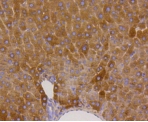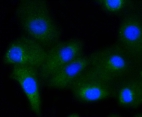Product Name :
GYS1 (phospho-S641) Rabbit monoclonal antibody Background :
Glycogen [starch] synthase belongs to the mammalian/fungal glycogen synthase family of proteins. Two forms of this protein exist, a liver form and a muscle form, both of which have the same function in the glycogen biosynthesis pathway. Glycogen synthase transfers the glycosyl residue from UDP-Glucose to the nonreducing end of a-1,4-glucan. The liver glycogen synthase protein is truncated by 34 amino acids compared to the muscle form. However, these enzymes differ significantly in their amino- and carboxyl-terminal regions. Muscle glycogen synthase serves to fuel muscular activity only and is regulated by muscle contraction and by catecholamines. Liver glycogen synthase mediates blood glucose homeostasis in response to nutritional cues. Defects in the gene encoding liver glycogen synthase results in glycogen storage disease type 0 (GSD0), a rare form of fasting ketotic hypoglycemia. Product :
Rabbit IgG, 1mg/ml in PBS with 0.02% sodium azide, 50% glycerol, pH7.2 Storage&Stability :
Store at 4°C short term. Aliquot and store at -20°C long term. Avoid freeze-thaw cycles. Specificity :
This antibody detects endogenous levels of human GYS1 protein only when phosphorylated at Ser641. Immunogen :
Recombinant antibody. Conjugate :
Unconjugated Modification :
Phosphorylation
GYS1 (phospho-S641) Rabbit monoclonal antibody Background :
Glycogen [starch] synthase belongs to the mammalian/fungal glycogen synthase family of proteins. Two forms of this protein exist, a liver form and a muscle form, both of which have the same function in the glycogen biosynthesis pathway. Glycogen synthase transfers the glycosyl residue from UDP-Glucose to the nonreducing end of a-1,4-glucan. The liver glycogen synthase protein is truncated by 34 amino acids compared to the muscle form. However, these enzymes differ significantly in their amino- and carboxyl-terminal regions. Muscle glycogen synthase serves to fuel muscular activity only and is regulated by muscle contraction and by catecholamines. Liver glycogen synthase mediates blood glucose homeostasis in response to nutritional cues. Defects in the gene encoding liver glycogen synthase results in glycogen storage disease type 0 (GSD0), a rare form of fasting ketotic hypoglycemia. Product :
Rabbit IgG, 1mg/ml in PBS with 0.02% sodium azide, 50% glycerol, pH7.2 Storage&Stability :
Store at 4°C short term. Aliquot and store at -20°C long term. Avoid freeze-thaw cycles. Specificity :
This antibody detects endogenous levels of human GYS1 protein only when phosphorylated at Ser641. Immunogen :
Recombinant antibody. Conjugate :
Unconjugated Modification :
Phosphorylation
-
 Western blot (WB) analysis of GYS1 (phospho-S641) Rabbit mAb at 1:1000 dilution Lane 1: Mouse liver lysate, untreated Lane 2: Mouse liver lysate, treated with AP
Western blot (WB) analysis of GYS1 (phospho-S641) Rabbit mAb at 1:1000 dilution Lane 1: Mouse liver lysate, untreated Lane 2: Mouse liver lysate, treated with AP -
 Immunohistochemical analysis of paraffin-embedded mouse liver tissue using anti-Phospho-Glycogen synthase 1(S641) antibody. Counter stained with hematoxylin.
Immunohistochemical analysis of paraffin-embedded mouse liver tissue using anti-Phospho-Glycogen synthase 1(S641) antibody. Counter stained with hematoxylin. -
 Immunohistochemical analysis of paraffin-embedded mouse liver tissue using anti-Phospho-Glycogen synthase 1(S641) antibody. Counter stained with hematoxylin.
Immunohistochemical analysis of paraffin-embedded mouse liver tissue using anti-Phospho-Glycogen synthase 1(S641) antibody. Counter stained with hematoxylin.
Bioworld Biotech only provide peptides for our antibodies and do not provide additional peptide customization services.
Price/Size :
USD 368/1mg/vial
Tips:
For phospho antibody, we provide phospho peptide(0.5mg) and non-phospho peptide(0.5mg).Describe :
Blocking peptides are peptides that bind specifically to the target antibody and block antibody binding. These peptide usually contains the epitope recognized by the antibody. Antibodies bound to the blocking peptide no longer bind to the epitope on the target protein. This mechanism is useful when non-specific binding is an issue, for example, in Western blotting (WB) and Immunohistochemistry (IHC). By comparing the staining from the blocked antibody versus the antibody alone, one can see which staining is specific; Specific binding will be absent from the western blot or IHC performed with the neutralized antibody.Formula:
Synthetic peptide was lyophilized with 100% acetonitrile and is supplied as a powder. Reconstitute with 0.1 ml DI water for a final concentration of 10 mg/ml.The purity is >90%,tested by HPLC and MS.
Storage:
The freeze-dried powder is more stable. For short time at 2-8°C. For long term storage store at -20°C.
Note :
This product is for research use only (RUO only). Not for use in diagnostic or therapeutic procedures.
 GYS1 (phospho-S641) Rabbit monoclonal antibody
GYS1 (phospho-S641) Rabbit monoclonal antibody  Datasheet
Datasheet COA
COA MSDS
MSDS SHIP
SHIP